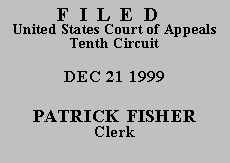

| UNITED STATES OF AMERICA,
Plaintiff-Appellee, ------------------------------------ MONTGOMERY C. AKERS,
Claimant-Appellant.
|
No. 99-3189 (D.C. No. 98-CV-1015-MLB) (Kansas) |
The United States filed a civil forfeiture proceeding under 18 U.S.C. § 981(a)(1)(C) against $5,348 in United States Currency, $1,000 in travelers checks, and a postal money order in the amount of $465, asserting they were properties or proceeds of properties involved in a violation of the federal bank fraud statute. The defendant properties were seized from Montgomery C. Akers after they were discovered on his person during a search incident to arrest. Mr. Akers filed a motion to dismiss the forfeiture proceeding, which was denied by the district court. The court thereafter struck Mr. Akers' answer as failing to establish his standing to contest the forfeiture, dismissed the government's motion for default as moot, and ordered the government to proceed in its forfeiture against the defendant properties. Mr. Akers appeals and we affirm.
The district court construed Mr. Akers' motion to dismiss as asserting that the government's forfeiture claim was not supported by probable cause and Mr. Akers appears to agree with that characterization on appeal. "The test for determining probable cause for forfeiture purposes is the same as applies in arrests, searches and seizures. Accordingly, the government must demonstrate a reasonable ground for belief of guilt supported by less than prima facie proof, but more than mere suspicion." United States v. $149,442.43, 965 F.3d 868, 876 (10th Cir. 1992). Whether the facts constitute probable cause is a legal determination that we review de novo. Id. We have carefully examined the affidavit submitted by the government below in support of its forfeiture complaint and we agree with the district court that probable cause existed to believe that the defendant properties were subject to forfeiture. "Once probable cause for forfeiture has been established, claimants may recover the defendant property only by establishing a defense to forfeiture by a preponderance of the evidence." Id. at 877. Mr. Akers has made no such showing.
On appeal, Mr. Akers claims the district court lacked subject matter jurisdiction because the government did not show probable cause, a claim that we have rejected as unsupported by the record. Although Mr. Akers also asserts lack of personal jurisdiction, the facts he offers in support do not show that jurisdiction was lacking. Mr. Akers further contends the district court erroneously failed to consider and address the answer he filed to the government's petition. The district court docket sheet, however, reveals that the answer was never filed below. Finally, to the extent that Mr. Akers raises claims for the first time in this court, we decline to consider them.
The orders of the district court are AFFIRMED.
ENTERED FOR THE COURT
Stephanie K. Seymour
Chief Judge
*.This order and judgment is not binding precedent, except under the doctrines of law of the case, res judicata, or collateral estoppel. The court generally disfavors the citation of orders and judgments; nevertheless, an order and judgment may be cited under the terms and conditions of 10th Cir. R. 36.3.